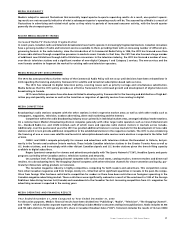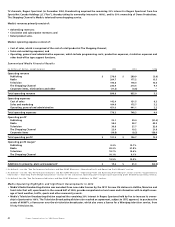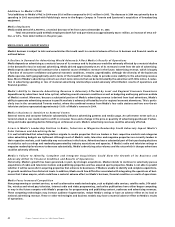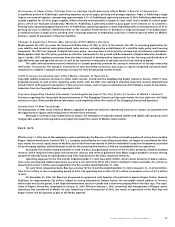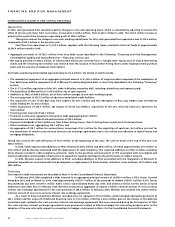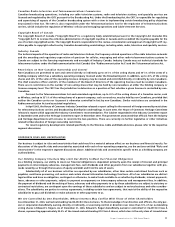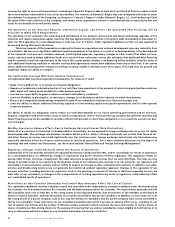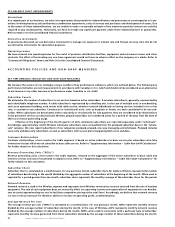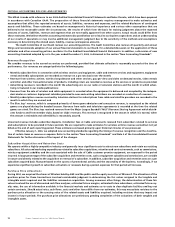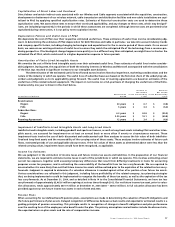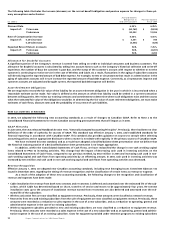Rogers 2004 Annual Report Download - page 53
Download and view the complete annual report
Please find page 53 of the 2004 Rogers annual report below. You can navigate through the pages in the report by either clicking on the pages listed below, or by using the keyword search tool below to find specific information within the annual report.
51
Rogers Communications Inc. 2004 Annual Report
Canadian Radio-television and Telecommunications Commission
Canadian broadcasting operations, including our cable television systems, radio and television stations, and specialty services are
licenced and regulated by the CRTC pursuant to the Broadcasting Act. Under the Broadcasting Act, the CRTC is responsible for regulating
and supervising all aspects of the Canadian broadcasting system with a view to implementing certain broadcasting policy objectives
enunciated in that Act. The CRTC is also responsible under the Telecommunications Act for the regulation of telecommunications
carriers, which includes the regulation of Wireless’ cellular and messaging operations and Cable’s Internet Services.
Copyright Board of Canada
The Copyright Board of Canada (“Copyright Board”) is a regulatory body established pursuant to the Copyright Act (Canada) (the
“Copyright Act”) to oversee the collective administration of copyright royalties in Canada and to establish the royalties payable for the
use of certain copyrighted works. The Copyright Board is responsible for the review, consideration and approval of copyright tariff roy-
alties payable to copyright collectives by Canadian broadcasting undertakings, including cable, radio, television and specialty services.
Industry Canada
The technical aspects of the operation of radio and television stations, the frequency-related operations of the cable television networks
and the awarding and regulatory supervision of spectrum for cellular, messaging and other radio-telecommunications systems in
Canada are subject to the licencing requirements and oversight of Industry Canada. Industry Canada may set technical standards for
telecommunications under the Radiocommunication Act (Canada) (the “Radiocommunication Act”) and the Telecommunications Act.
Restrictions on Non-Canadian Ownership and Control
Non-Canadians are permitted to own and control directly or indirectly up to 331/3% of the voting shares and 331/3% of the votes of a
holding company which has a subsidiary operating company licenced under the Broadcasting Act. In addition, up to 20% of the voting
shares and 20% of the votes of the operating licencee company may be owned and controlled directly or indirectly by non-Canadians.
The chief executive officer and 80% of the members of the Board of Directors of the operating licencee must be resident Canadians.
There are no restrictions on the number of non-voting shares that may be held by non-Canadians at either the holding company or
licencee company level. The CRTC has the jurisdiction to determine as a question of fact whether a given licencee is controlled by non-
Canadians.
Pursuant to the Telecommunications Act and associated regulations, up to 20% of the voting shares of a Canadian carrier, such
as Wireless, and up to 331/3% of the voting shares of a parent company, such as ourselves, may be held by non-Canadians, provided that
neither the Canadian carrier nor its parent is otherwise controlled in fact by non-Canadians. Similar restrictions are contained in the
Radiocommunication Act and associated regulations.
In April 2003, the House of Commons Industry Committee released a report calling for the removal of foreign ownership restrictions
for telecommunications carriers and broadcasting distribution undertakings. In June 2003, the House of Commons Heritage Committee
released a report which opposed the Industry Committee’s recommendation. The Cabinet responded to the Industry Committee report
in September 2003 and to the Heritage Committee report in November 2003. The government announced that officials from the Industry
and Heritage departments will convene to reconcile the two positions. There are currently no further legislative or other initiatives
related to liberalization of foreign ownership restrictions.
For recent regulatory developments related specifically to the Wireless, Cable and Media divisions, please refer to the respective
segment discussions.
CORPORATE RISKS AND UNCERTAINTIES
Our business is subject to risks and uncertainties that could result in a material adverse effect on our business and financial results. For
discussions of the specific risks and uncertainties associated with each of our operating companies, see the sections entitled “Risks and
Uncertainties” in the respective segment discussions above. Additional risks and uncertainties specific to RCI as a holding company are
outlined below.
Our Holding Company Structure May Limit Our Ability to Meet Our Financial Obligations
As a holding company, our ability to meet our financial obligations is dependent primarily upon the receipt of interest and principal
payments on intercompany advances, management fees, cash dividends and other payments from our subsidiaries together with pro-
ceeds raised by us through the issuance of equity and debt and from the sale of assets.
Substantially all of our business activities are operated by our subsidiaries, other than certain centralized functions such as
payables, remittance processing, call centres and certain shared information technology functions. All of our subsidiaries are distinct
legal entities and have no obligation, contingent or otherwise, to make funds available to us whether by dividends, interest payments,
loans, advances or other payments, subject to payment arrangements on intercompany advances and management fees. In addition,
the payment of dividends and the making of loans, advances and other payments to us by these subsidiaries are subject to statutory or
contractual restrictions, are contingent upon the earnings of those subsidiaries and are subject to various business and other consider-
ations. The subsidiaries are parties to various agreements, including certain loan agreements, that restrict the ability of the respective
subsidiaries to pay cash dividends or make advances or other payments to us.
We Are Controlled by One Shareholder, Whose Interests May Conflict With Those of Other Shareholders
As at December 31, 2004, we had outstanding 56,235,394 RCI Class A shares. To the knowledge of our directors and officers, the only per-
son or corporation beneficially owning, directly or indirectly, or exercising control or direction over more than 10% of our outstanding
voting shares is Edward S. Rogers. As of December 31, 2004, Edward S. Rogers beneficially owned or controlled 51,116,099 RCI Class A
shares, representing approximately 90.9% of the issued and outstanding RCI Class A shares, which class is the only class of issued shares


